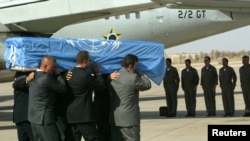On World Humanitarian Day, Saturday, the United Nations called for a stop to the deliberate targeting of civilians and humanitarians who risk their lives to help desperate men, women and children caught in war.
To mark this year’s observance, the U.N. is focusing on violence against health care workers and facilities, and its implications for the population.
In kicking off the day’s event, U.N. Secretary-General Antonio Guterres said “The health of humanitarian workers who set out to aid, heal and protect these people are themselves deliberately targeted for attack.
”Staff are killed, wounded and detained,” he said. “Aid and medical supplies are looted and obstructed; health clinics and hospitals are damaged and destroyed.”
The United Nations reports there were 302 attacks on health care workers in 2016, including 418 deaths and 561 injuries in 20 countries. Most occurred in Syria.
In the first three months of this year, the U.N. reports 88 attacks, 80 deaths and 81 injuries in 14 countries. Syria, which is in its sixth year of war, recorded 58 attacks.
“One of the shocking things about the last two or three years is the amount of attacks on hospitals,” said Mona Rishmawi, Chief of the Rule of Law, Equality and Non-Discrimination Branch in the Office of the High Commissioner for Human Rights.
“One of the fundamentals of international humanitarian law is that the sick and wounded are protected," said Rishmawi. “If you attack those who are working with the sick and wounded and the infrastructure, actually they are denying them a big part of protection and that is very serious.”
Rishmawi spoke to VOA about her own brush with death on August 19, 2003. On that day, the United Nations office in Iraq’s capital, Baghdad, was bombed, killing the head of mission Sergio Vierra de Mello and 21 others.
Rishmawi was working as de Mello’s human rights agenda adviser. She said she survived the terrorist attack because she was late for a meeting with him.
“I feel quite lucky that I actually survived the attack and was able to help a few others around me at that moment and I think that was important,
“These experiences never really go away,” she said.
Rishmawi, who was injured and hospitalized, said she did not talk a lot about her experience. When pressed on the issue, she seemed hesitant to describe herself as suffering from survivor’s guilt.
“My husband was also there, so I felt a huge responsibility also towards our families …We did not realize how dangerous it was," she said. “I had this sense of -- I would not say guilt -- but a sense of responsibility towards our elderly mothers, our family. And, of course the families of the others."
De Mello and his staff arrived in Baghdad on June 2, 2003, about one month after President George W. Bush declared “Mission Accomplished” on the war in Iraq. The U.S. invasion of Iraq, which began March 20, 2003, had lasted 21 days.
Rishmawi said the U.N.’s mission to help formulate a vision for the future of the country was cut short when a foreign suicide bomber destroyed the Canal Hotel, taking the lives of 22 people and injuring many more.
She said August 19 was the day when the United Nations lost its innocence. She told VOA the fatal explosion was a turning point in the United Nations mission.
She added that the organization shut down its open line of communication with the people it served and became more protective.
“It was the first time we realized that we could be targeted for something very, very serious,” she said. “So, I think the U.N. basically started to take more precautions about how to deliver some of its work and how to deliver humanitarian, particularly humanitarian assistance …to the people who are most in need.”
Five years after the tragic event, the General Assembly adopted a resolution designating August 19 World Humanitarian Day to pay tribute to aid workers who risk their lives in the service of others.
Rishmawi said it is important to shed light on the extent of suffering inflicted on people in conflict by the deliberate targeting of hospitals and health care workers and to make the perpetrators accountable for their crimes.
While acknowledging the difficulty in bringing war criminals before a court of law, she said ultimately justice would not be denied.
“Even if it is delayed, things will happen. That is what we learned from Latin America. That is what we learned from years of war,” said Rishmawi. “People do not forget what happened to them. They might tolerate it for a while, but the moment they stand up, they do not forget.”




